2 buildings
|
2 buildings
|
Stream
|
Park
|
Hill
|
Key building
|
2 buildings
|
2 buildings
|
Boulevard
|
A site for fans to publish After Action Reports, stories, ideas and links using TFLs Platoon Forward
Gen Eisenhower
Saturday, December 3, 2011
Soldiers of the Rearguard or, The Social(ist) Network
Saturday, November 19, 2011
Captain Karpov Rides Again!

Hill
|
Open
|
River
|
Wooded Hill
|
Light Woods
|
Heavy Woods
|
Open
|
Light Woods
|
Crops
|
Wednesday, October 12, 2011
Captain's Courageous - or - The Light Company Gets a Bath
Monday, October 3, 2011
Audet's Church: A D-Day Plus 3 Skirmish

07:45, 8 June, 1944 Normandy - within the lines of La Regiment de la Chaudiere,
"Things are going well for us. The Division is ashore, we've linked up with the British, and we're taking ground. Just as importantly", Major Charpentier paused to look around at his platoon commanders, "D Company succeeded in our first tasking yesterday. We took some casualties, but the CO is pleased that we pushed out and straightened our sector. Well done all."
Lt. Denis Audet was hoping to hear the Major praise 18 Platoon for their role in the company attack yesterday, but was disappointed as the OC continued. "Today is maintenance and routine patrolling, but we do have one special job. Our recce platoon heard some motors and noted some vehicle activity here, at Eglise St. Michel. They also report that the church is suitable for an OP that could overlook our battalion lines. I need a platoon to have a look at it and if possible take the church. You were all in action yesterday so I'm asking for volun ..."
Charpentier stopped as a hand shot up. Audet saw Capt. Cournoyer roll his eyes but he didn't care. "My boys can do it, sir."
"Good. Go get the recce brief from Lt. Aubin and report back in an hour with your plan and your support requirements."
Here's the table I rolled up using Platoon Forward's terrain generator.
Canadian side, left to right: Forest, Building, Hill
Center, left to right: Forest, Significant Building, Open
German side, left to right: Open, Open, Swamp
Since it was Normandy I interpreted the open areas to be hedged, and since there is a significant building in the centre, that seemed to require roads and perhaps suggest a road junction. Here's the result.
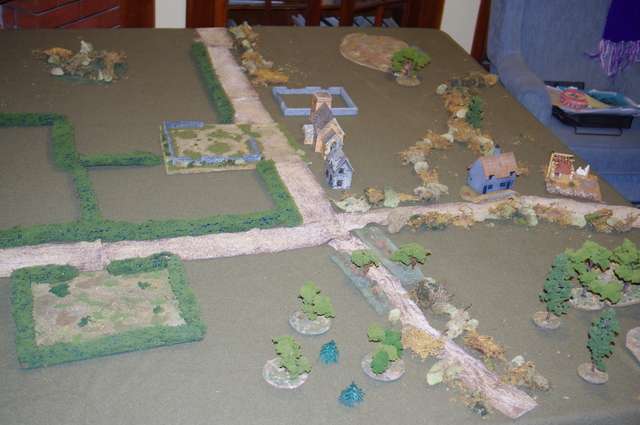
18 Platoon was sitting near the foxholes they had slept in the night before, eating a breakfast of compo rations: tinned fruit, biscuits, and coffee. Adjutant (French for Warrant Officer) Beaulieu was telling the new corporal, Legros, about his adventures with Legros' pere in a barfight in the last war when Lt. Audet came strolling over with a worrisome purpose. "Have the platoon ready to move in thirty minutes, Adjutant. Light fighting order. We have a patrol."
Beaulieu climbed to his feet, feeling every one of his forty three years in his bones. "Us again, sir?"
Audet grinned and slapped the older man's shoulder. "Us again. Natural choice. We showed them we're the best, eh?"
As Audet walked away, Beaulieu took a long drag on his Players and threw it to the ground. He looked at his corporals. "You heard Clark Gable. We're the best." He shook his head. "Idiot."
By 09:00 18 platoon has been briefed and guided into position by two scouts from recce platoon. Audet had surveyed the ground through binos with in company with recce's Lt. Aubin. He was reasonably happy with his supports. He had been hoping for a tank, but a vehicle from the Carrier Platoon would give him some recce capability and another Bren gun, while the same Vickers HMG team that had worked with him in their last fight had been reassigned. Major Charpentier had approved his plan and now it was time to go.
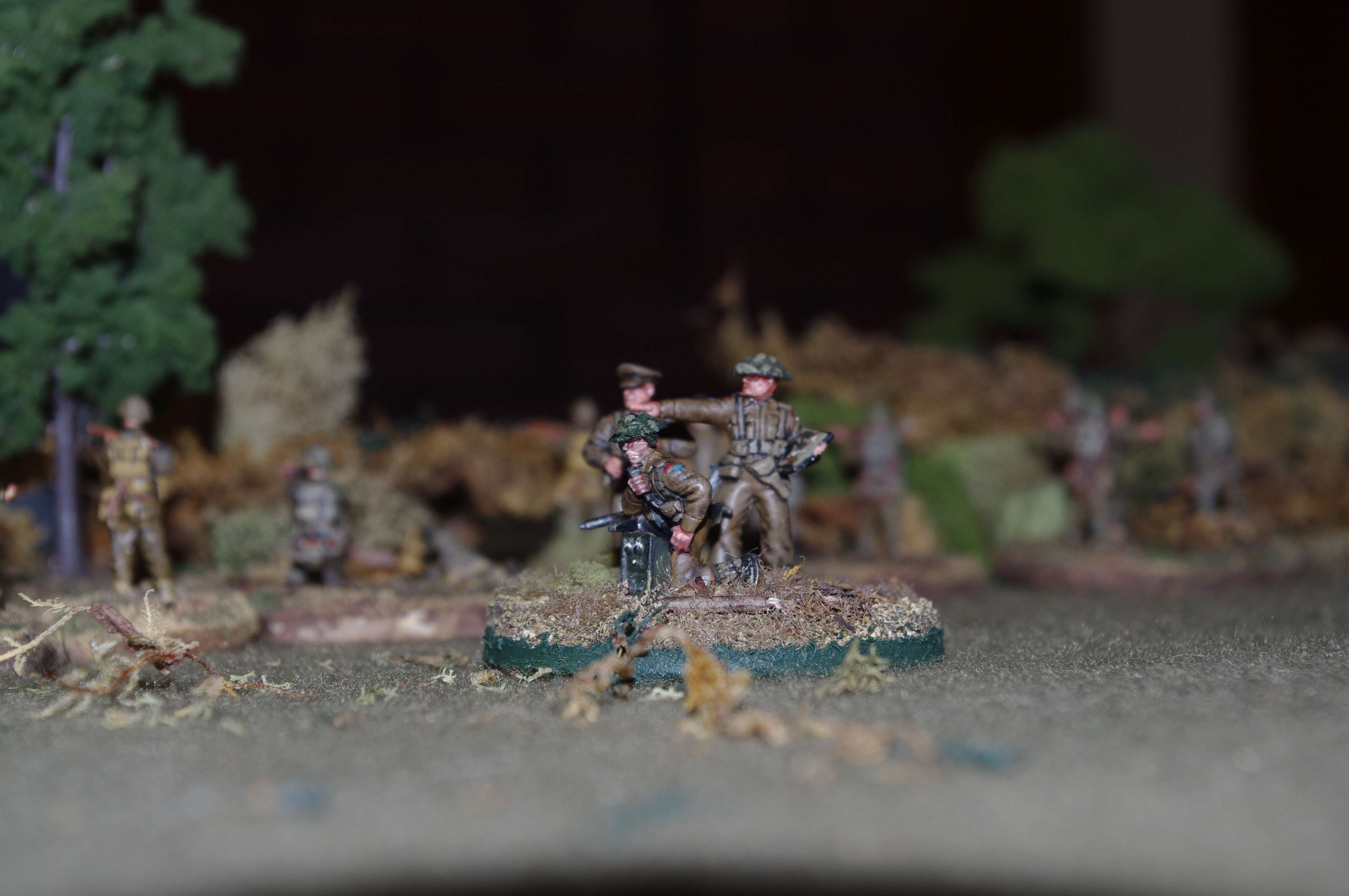
Lt. Audet briefs Major Charpentier on his plan while the men of two section crouch ready in the hedges on the start line. Command group are plastic figures by Valiant.

This small image looks bigger when you click on it. The blue text and arrows show Audet's plan as follows. Vickers HMG and 1 section under WO Beaulieu will move onto the hill and establish a firebase to cover platoon's advance. With that covering fire, Audet will lead 2 section towards the church at the right moment, while three section with the Bren carrier will probe up the road into the village and look for possibilities to outflank the church posititon.
The black shows the force that PF generated for the Germans. In addition to dummy blinds, the Germans had an infantry section with a Big Man in the church, a heavy AT gun behind the church, two tanks, an MMG section at the crossroads, and a Forward Observer in contact with a four gun 81mm mortar section. Since German resistance would still be firming up just three days after the invasion, my premise is that the infantry and the FOO belong to 716th Div and have orders to hold the church and the village, the other elements belong to separate formations, most likely 21 Panzer Div, and are not attached or supporting. So the two tanks, Pz IIIs, and the AT gun, a towed 88mm, are passing through and have orders to exit the board.
Gefreiter Lothar Schreiber sat on board bench in the little church steeple and listened to the conversation in the street below. Janke, his sergeant was in the street, sharing a smoke with a Luftwaffe leutnant commanding the 88 and crew tucked in alongside the church. Schreiber was impressed at the careful placement of camo netting and twigs to conceal the gun and its heavy mover. He could appreciate the need for it. A few minutes ago a flight of jabos had passed low over head, hunting for targets further inland. For the last three days all he had seen were Tommy aircraft, and he wondered when one would get bored and strafe his steeple just for sport.
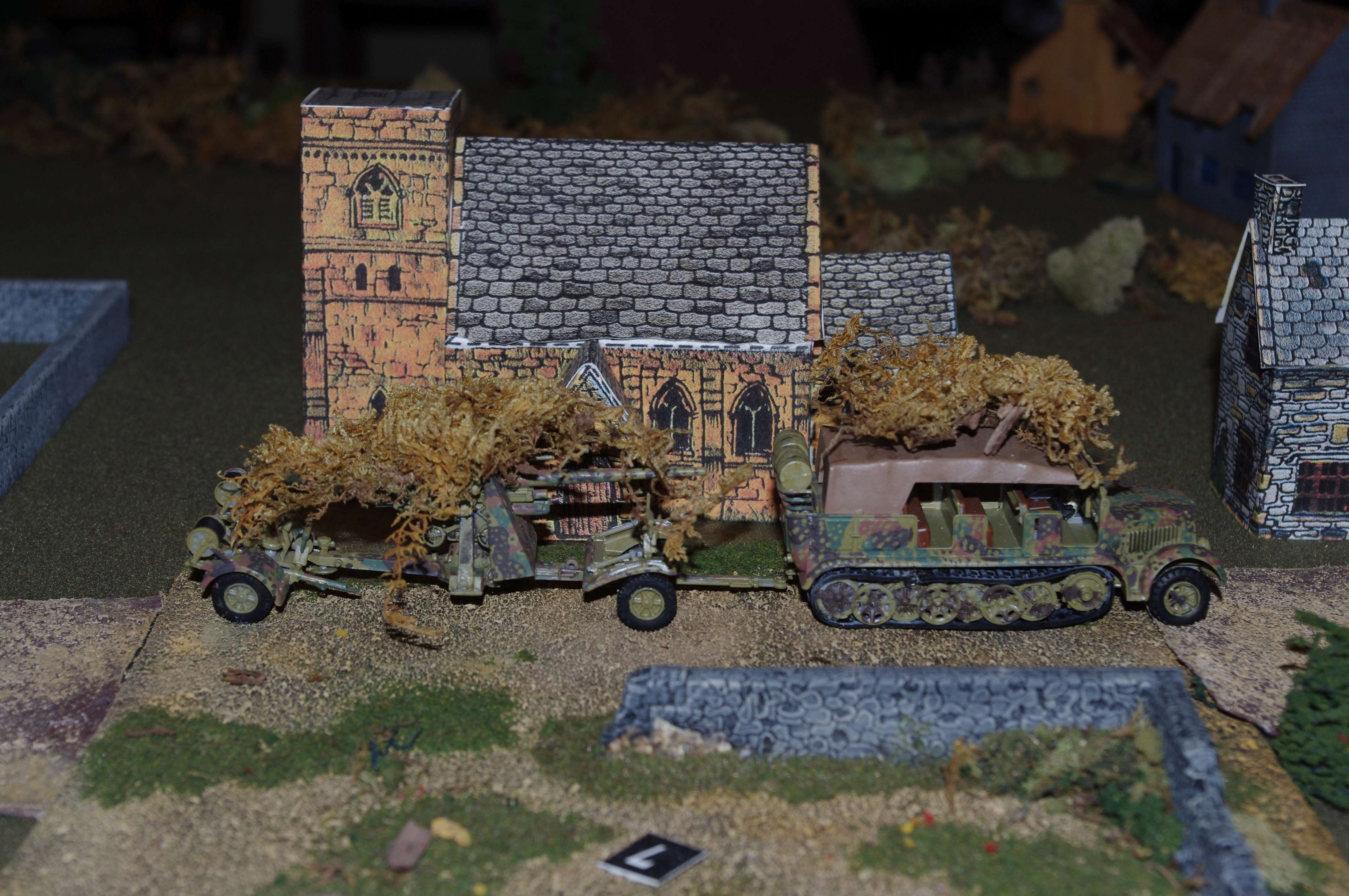
Limbered 88mm gun and heavy mover, carefully tucked behind the church. I've had this model for years and never used it until this game. ESCI, I think.
"He's been gone too long." The Luftwaffe leutnant was peering up the street, hoping to see the military policeman return on his motorbike. The chaindog was route control for this sector, and had held the gunners in place while he went to check that the route further inland was safe for transit.
"Be nice if you could stay, sir. We could use your support. Same with the Panzer boys." Janke pointed to the orchard across the road from the church, where two Pz IIIs, also heavily netted and concealed, were parked, their crews lounging about.
"Sorry. Got to get back to my unit, wherever they are. Been wandering for three days now, ever since the Tommies arrived. And as for the Panzers, while, they don't talk to the likes of us air force types."
Schreiber was about to chuckle at the joke when Moller, number two on the MG42, elbowed him and pointed out the belfry to the south. "Actung! Tommies on that hill."
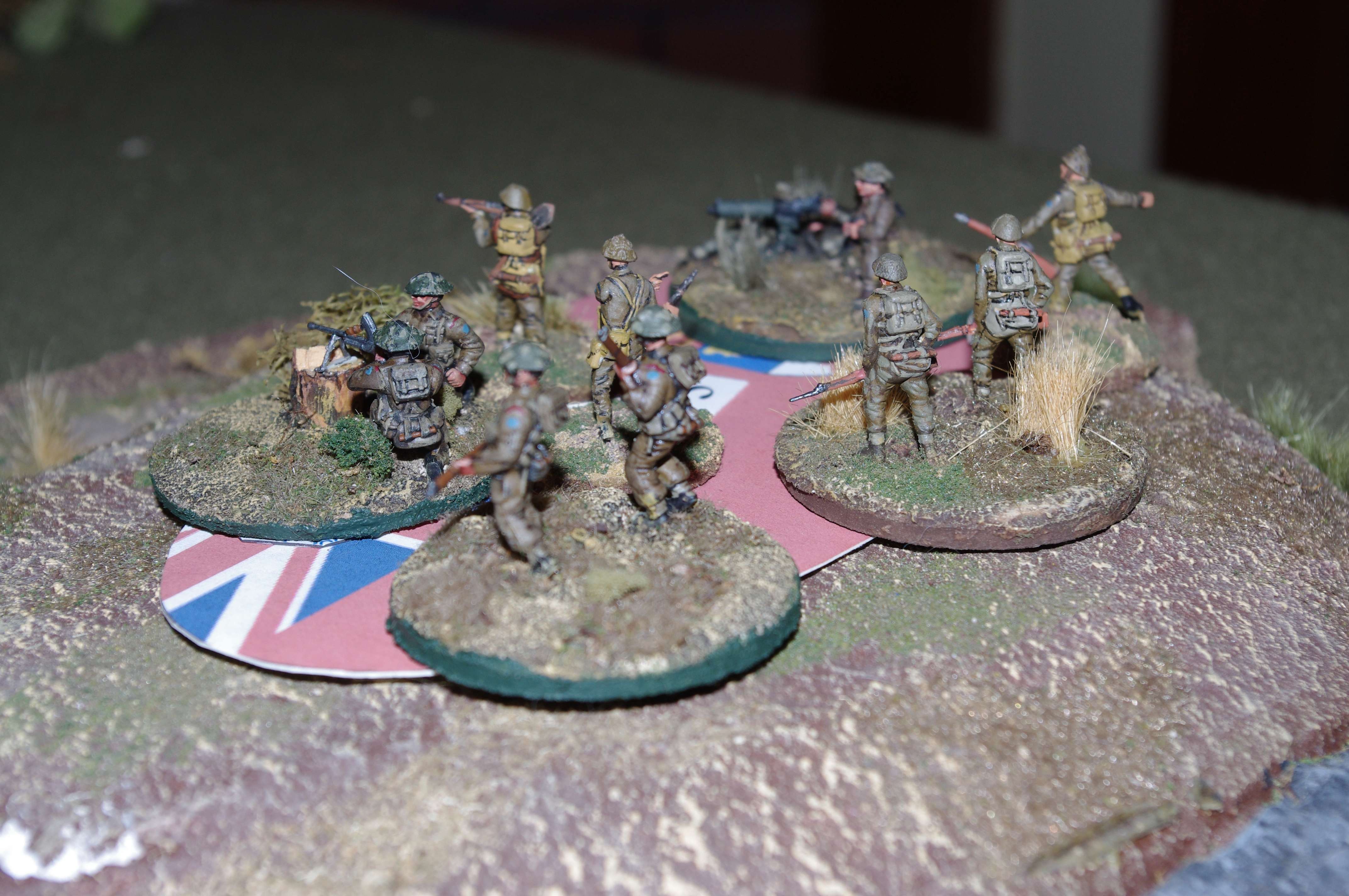
1 section and the attached HMG move onto the hill and come off their blinds.
Beaulieu heard the first rounds of MG tearing the air above him. They were shooting high. He had expected the Germans to have opened fire earlier, but perhaps some sentry had been snoozing. "Get to the crest and let 'em have it. All fire on that church." Now rifle fire was coming at them as well, and gouts of earth were kicking up closer to them. Cpl. Legros and his Bren team had already flopped down and seconds later started chugging out rounds at the church. The riflemen of One Section joined them and Enfields began cracking. Two of the Vickers team arrived a moment later, toiling under their burdens, and began setting up their weapon. Their third man lay crumpled twenty feet back. Beaulieu raced over to him, retreived the heavy ammo boxes, and staggered back to the machine gunners. "Spray that f'n church good."
The sound of fire to his right was Cpl. Matthieu's signal to start 3 section moving on the road to the left of the church. With the Bren carrier leading the way in a cloud of exhaust, he and his men cautiously went forward, some hugging the walls of a ruined brick cottage, others crouching behind the carrier. Within minutes they realized that they had walked into the firelane of a machine gun, and three section was pinned.
Inside the church it wasn`t much better. Schreiber and his LMG crew huddled for dear life behind thick stone, keeping well away from the open spaces in the belfry. The fire from the hill had picked up and wasn`t stopping. Through the din he was aware of a young landser calling from the stairway. `Sgt. Janke is dead, corporal!`
Verdamnt! `Well, keep shooting!` he yelled back, then cringed as another burst of 303 lashed the steeple.
The Germans took an unlucky break early on when their Big Man in the church, Janke, was killed. Presumably he looked out a window at the wrong time. The character of Schreiber would be the replacement if the dice favoured it. Meanwhile, as 1 and 2 sections and the HMG under Audet and Beaulieu remained active, peppering the church, Matthieu would not have his card come up for many turns, effectively taking him and three section out of the game.
The German 88 had its card come up several times and did the sensible thing, pulling away from the church and towards the German rear, where it safely exited despite a few shots from the Bren. The two Pz IIIs followed. Without an effective infantry leader in the church to coordinate with them, they did the sensible thing and retreated off the board edge, since this was an assembly point on a road move and not a staging area for combat. One tank did take a shot at the Bren carrier which was visible down the road, and while the shot was a near miss, it convinced the driver that escape and survival was his best bet. His exit only seemed to convince Matthieu and 3 section to remain invisible and under cover.
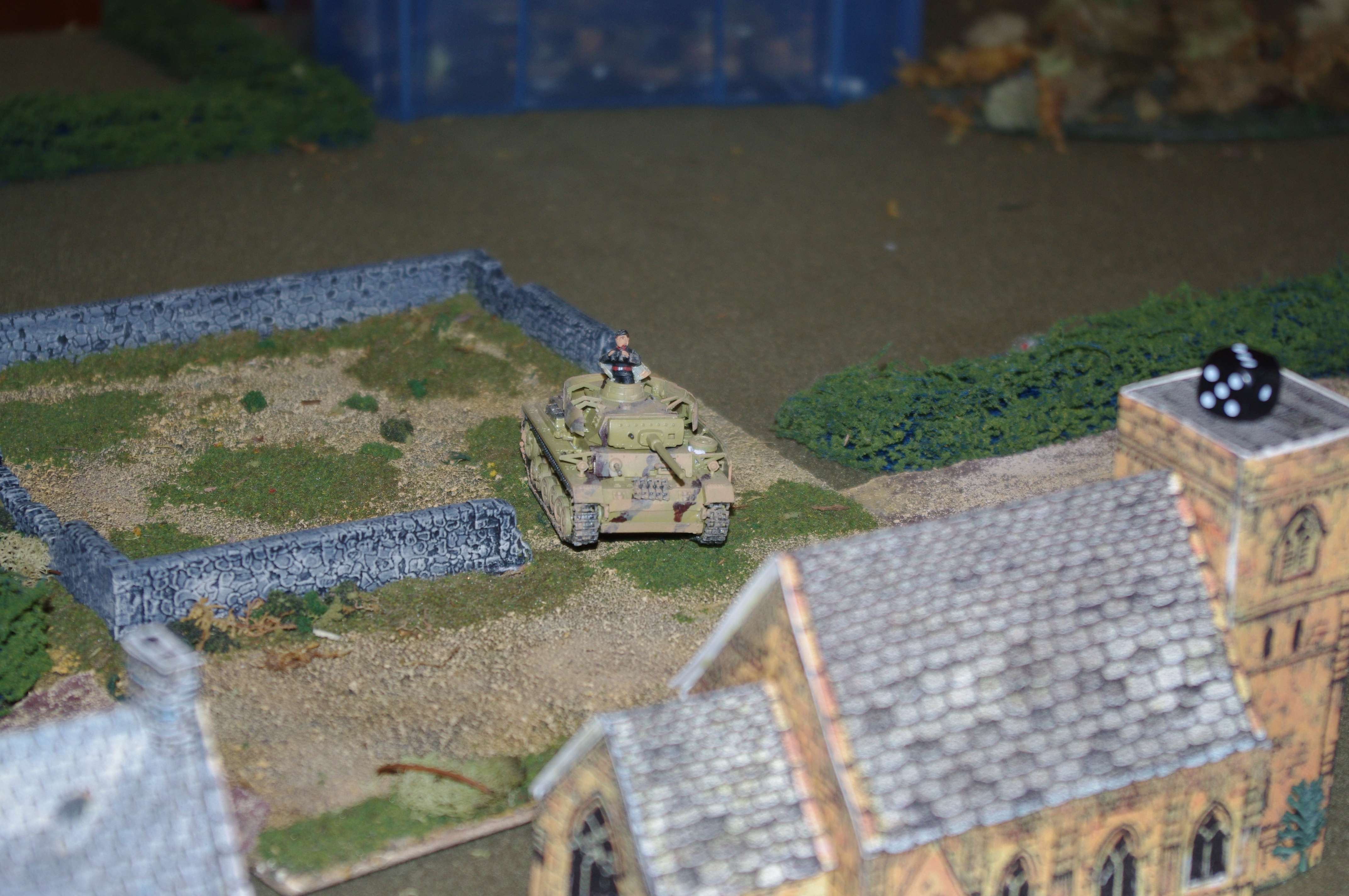
Gefreiter Schreiber watches from the steeple in dismay as the second PZ III pulls out of its leaguer and heads away from the fighting.
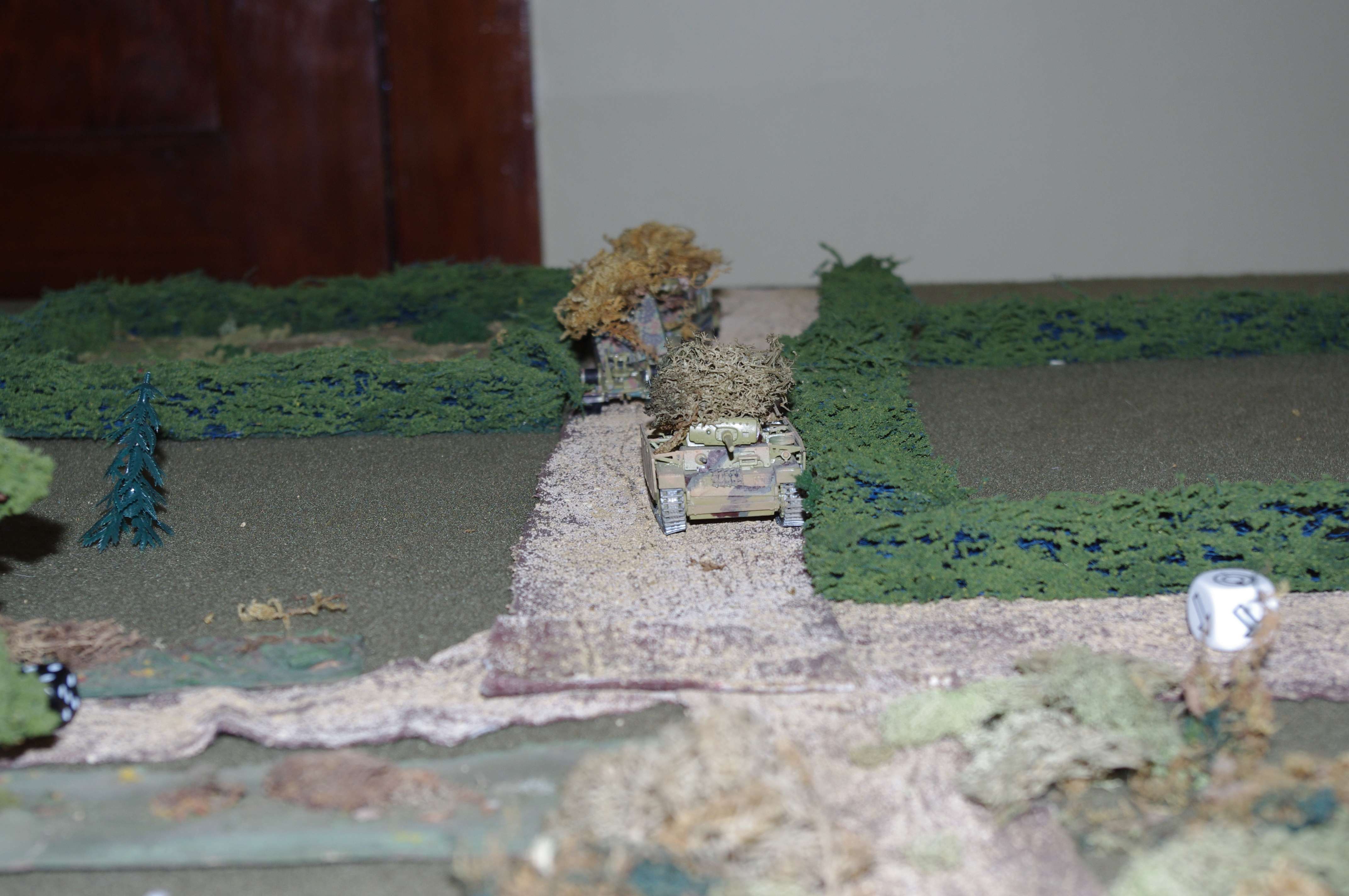
PZ III covers the withdrawal of the towed 88 and fires a shot at the Bren carrier.

Which promptly flees back down the road and off the table.
Leutnant Gunther Horst and his radio operator had been driving cautiously towards Eglise St. Michel, following instructions from the day before to identify an OP to direct the fire a section of 81mm mortars. His major had said something about stabilizing the front line but as Horst heard small arms fire he had doubts that there was any front line. Signalling his driver to halt, they left the kubelwagen amidst some trees and crept forward until he had a line of site on the village.

The FOO Lt. Horst sets up in the woods with a line of sight to No 3 section.

Mortar shells begin to fall on No 3 section (background) while Audet starts 2 Section towards the church.
Matthieu and his section flattened themselves against walls and buildings as mortar shells began to fall nearby. The corporal could see from the postures of his men and the expressions of a few nearby that they were thoroughly pinned. He wasn't going anywhere, but he lifted his head briefly as he heard a new sound, tank tracks. The reassuring shape of a Sherman appeared in the roadway (a random event generated an Allied reinforcement).

Through his binoculars, Audent could see fragments of stone flying from the walls of the church as the Vickers gun continued to lash it. The rate of return fire from within the church had fallen off considerably. Now was the time. "Follow me, les boys!" Once again his men were sprinting behind him. There was a brief burst of Spandau fire from the steeple, and a man staggered and fell behind him, but they were through to the wall now. "Grenades, ready and ... now!" A flurry of grenades were tossed through the windows, with bangs and screams. A soldier kicked the door down and Audet stepped forward, Sten gun spraying. There was no return fire, the nave of the church was littered with six field gray forms, sone still, some moaning. "Kamerad", a voice called from the steeple stairs. Gefreiter Schreiber and his surviving No 2 had had enough. Minutes later, WO Beaulieu on the hill twatched his lieutenant wave jauntily from the steeple. "F*** me, he did it again!"
Epilogue: The Canadian close assault on the church was an amazingly lucky run of sixes, and wiped out the defending rifle section. With two of the three LMG crew surviving in the steeple, there seemed to be little point in further resistance. THe advent of the Sherman was enough to scare off Lt. Horst and the MMG team at tbe crossroads. Lt. Audet had his church and his casualties had been amazingly light. One killed from the supporting Vickers crew, and two riflemen lightly wounded from 2 section during their assault on the church. A very small bill for a decisive victory. In the next post, we'll see how Audet fares in his quest for recognition and promotion. Thanks for reading, and blessings on your die rolls. MP+
Monday, July 25, 2011
The Return of Captain Beesley and the East Southhamstershires
"
"
Being dismissed as if these could not possibly be any questions that he could have with such clear and decisive orders, Beesley gathered his company together to move out.
The light company marched out on a lovely morning with Lieutenant Swiven and his survey party. They arrived at a small village near a river crossing. The survey party began their work. Beesley established a sentry post near some ruined walls just to the north of the town. The river is north of the sentry post.
Next, Beesley set a picket along a strong stone fence at the north end of the village. Here Sergeant Smallwood and eight men waited for sign of the enemy.
The light company enjoyed some rest for a few days while the survey was being done. On the third day, the sentry spotted an advancing french unit crossing the bridge. A small unit of carabiniers quickly chased the sentry away and occupied his position.
The warning of the sentry brought out Lieutenant Harthwaite with 8 men and Sergeant Langtree with twelve men from the houses and formed a line between Sergeant Smallwood's position and the northern most house.
The carabiniers and Lt Harthwaite's commands exchanged fire with little coming of it. The French moved across the bridge without any serious opposition. One blind headed to the top of the hill on their left while another ran towards the stand of crops on their right. Two more proceeded down the center of the road.
Captain Beesley and 8 men moved to support Sgt Smallwood along the stone wall. One french blind continued forward until it was spotted only 12" from the front of the British lines. Once spotted, it revealed itself to be a fast moving french column of 4 groups of nine men each. The British opened fire across their line against the column massing a significant amount of shock and some casualties. The blind following the french column stalled near the bridge.
In the fight that began against the column, the French commander, Lt Gerard managed to remove shock and charge the column into Sgt Langtree's line. In the resulting fisticuffs, both Langtree and Gerard were killed. Two rounds of fisticuffs saw Langtree's command break and fall back.
The luck of Gerard's column died with him as Lt Harthwaite, Sgt Smallwood and Captain Beesley's groups opened fire on the column at nearly point blank range. The fire shattered the column that was never able to recover and it routed off the board back where it came from.
At this point, Lt Harthwaite spotted the other blind. This was a french half company commanded by Captain Amaury and Lieutenant Ernest. Captain Amaury believed that his men could carry the day. Rushing his men in two separate formations of two groups of nine each they moved quickly up either side of the road. This time, the British were able to bring the advance to a halt 12" from their lines. The French were never able to overcome the mounting casualties and shock and were forced to withdraw. They lost another big man - Sergeant Laurent.
Once the smoke of the battle cleared, the British had suffered eleven casualties including Sergeant Langtree. Sgt Langtree managed to nearly stop the French column through his weight of fire but died galantly leading his men against the French charge. The French lost 29 men in casualties including two big men: Lt Gerard and Sgt Laurent.
======================================================================
The use of a column to charge the British line nearly worked. Had the French had access to a reasonable bonus card, they may have pulled it off. Instead they had drawn Water and Stand Fast. The British started with two Stand Fast cards. They then drew all of the French cards (Hop to It and Pas De Charge). The British used their two Stand fast cards well and received grasp the nettle cards as needed. The french always seemed to have their big men arrive before their GTN cards.
This was a fun solo game and I was able to play with using columns. Reading Cornwall's Sharp books it seemed that the French loved to advance in column. The tactic must of worked somewhere for them to continue to try it. Here it nearly worked and the column was able to reach the British line and did break it. They just lacked the power to stay in the fight after the initial clash.
Sorry for the lack of pictures as the camera (my cell phone) was absconded by my son so he could play angry birds.
Tuesday, July 12, 2011
Interlude and Paranoia
Suffering over 50% casualties in one battle is enough to take the stuffing out of any unit. So, it was not surprising when the dice told me that it would be about 3 weeks before the next engagement. That should be enough time to get the replacements in, and at least teach them which end of a rifle to point at the enemy. Once again, it was consolidation time within the company. As each platoon is now down to basically one squad each, it only made sense to group the survivors together into the new 1 Platoon, and send the replacements into 2 Platoon. That gives 1 Platoon almost a full strength TO&E, with 2 squads of 10 and one of 8. 2 Platoon now has a squad of 10 men and a squad of 7, all of which are replacements. While going through the casualty figures, I discovered that the 50mm mortars had not been completely wiped out. There was 1 soldier left alive out of the two crews, so he went into 2 Platoon. That gave the second squad 8 men. 3 Platoon has ceased to exist. Oddly enough, this might benefit the company, as the attentions of the (too few) leaders will not be as divided among the company subgroups.
Since this is September 1941, there is a definite shortage of Junior and Senior Lieutenants out there to assign to the company. So, it is time for Captain Karpov to reach into the ranks for another big man. He does just that, and comes up with Junior Sergeant Zinoviev. Zinoviev is a scholarly type, whose motivation is religion. Maybe his family wanted him to go into the priesthood, or maybe he comes from a background like Jr. Lt. Lobachevsky did. Either way, it’s not something that is going to help him go far in the Red Army. As a squad leader, he is only a Level I leader, but has a D4 ability, which is better than both of the officers he is replacing. Apparently that scholarly personality, combined with some practical experience, has taught him a little bit about handling troops. He has an even temperament, and comes from an average background, so it seems obvious that Capt. Karpov has chosen him for his ability. Surely this is a relief instead of having to deal with what he was given, as was the case with Bartov and Lobachevsky. Since he is a Junior Sergeant, Zinoviev can only influence one squad within the platoon; however, that is all you can do once the shooting starts anyway so it shouldn’t be that much of a negative.
Of course, it wouldn’t be the 1941 RKKA without the paranoia mentioned in the title. Captain Karpov might not be in disgrace, but he is surely under a cloud. It doesn’t matter that he was outnumbered, undermanned and in a bad position. What matters is that he did not carry out the combat task assigned to him. While there is no evidence (yet) that he is a traitor to the Motherland, it seems clear to the upper echelons that the reason he lost this last engagement is that there was not a Commissar to provide the men with the proper fighting spirit. So, regimental HQ has sent one of their political officers down to ‘assist the Company Commander until Comrade Vlasov returns to duty.’ Enter Regimental Commissar Klimkinov. He is a generous type, just like Vlasov. However, he is motivated by the Government, so this political officer is one of the ‘true believers.’ He is a better leader than Vlasov, being a Level II officer but that is probably expected since he is higher up the political chain of command. He has an even temperament, and comes from a military background just like Karpov does. Klimkinov probably thinks this will help him get along with Karpov, since they have something in common there. I don’t think that is the case, though.
Let’s look at things from Karpov’s view. He lost half his command in the last battle, and lost the battle. He got reinforcements, but instead of more leaders he got a commissar from regimental to ‘assist’ him. For Karpov, there is no way this could be good. The flip side of this is that if Karpov can get past his paranoia, he might realize that having a contact on the regimental staff could be a good thing, even if it is on the political end. Since Klimkinov’s assignment with the unit is a short one, it will be interesting to see if Karpov comes to this conclusion, or continues to look for the NKVD squad to show up.
The next mission will be a screening of friendly engineers while they do some roadwork. Karpov will probably see this as a slight against his unit as well. After all, a regimental commissar looking over his shoulder AND a ‘milk run’ type of mission for the company’s return to combat can only add up to one thing. The obvious conclusion is that regimental HQ doesn’t trust him or his men. Given that he is an aggressive, revenge motivated type, there is no doubt that he will drive his troops hard in the next engagement. That way, he will get his revenge against the Germans, and prove to the new commissar that he is not a traitor. October 1, 1941 (the date of the next action) should be an interesting day for all concerned.
Wednesday, June 29, 2011
…but Defeat is an Orphan

The problem with a winning streak is that eventually it will end. The next mission that I rolled up was Scenario M, “A Hasty Defense.” The dice told me that I had only hours to prepare. Obviously, this would be the German counterattack to try and retake the village. Although I had rolled up 15 replacements after the attack, I decided that they probably would not have arrived in time so I would do without. Consequently, the map is the same as before, except that this time I was the one defending.
| Open | Open | Road |
| Light Woods | Village (with road) | Light Woods |
| Light Woods | Open | Road |
Platoons 1, 2, 3 (only 2 squads each due to losses)
Captain Karpov, Jr. Lt. Lobachevsky
2x 50mm mortars
3x MMG
2x 45mm ATG
3x T-26 (these would come in later, as reinforcements)
The game started with two German stonks that killed some infantrymen and both of the limbers for my ATGs. Then, I watched in horror as a wave of German blinds rolled onto the board. One of my ATGs spotted tanks, and drew first blood, but it was mostly downhill after that. As the spotting rolls revealed the German force, it was very clear that they wanted this village back. I was facing:
3x infantry platoons (all at full strength)
2x HQ infantry squads
3x 50mm mortars
6x Leaders
1x MMG
1x ATR
4x Pz III
3x Pz IV
2x SiG 150mm Bison/Pz I SPGs
It was a large force, and a true combined arms assault. The tanks took on the ATGs, the light mortars smoked in the village huts so that the German infantry could advance, and the 2 SPGs fired on whatever the mortars couldn’t cover. While there were some small successes in the woods on the left, within minutes the Germans were in the village and a series of close combats broke out in the huts. Lobachevsky went down, and since his squad lost the assault, they didn’t stop to see if he was dead or wounded. Captain Karpov fought off one assault, but then was isolated, with Germans on his left and right. At this point, he decided to pull what was left of his command out of the village. At this point, things were so crazy that he and his squad were close assaulted in the street by another German squad. After he fought them off, the survivors streamed out of the village closely followed by the Germans. Things were so bad that the squad Karpov was attached to was machine-gunned, leaving him as the only survivor. At this point the T-26s arrived, only to be shot down by the Panzerwaffe. Two tanks were destroyed, and the other was abandoned due to damage. The game ended with the survivors running off the board, and the Germans re-establishing themselves in the village.
Soviet casualties were almost as bad as the combat results. 1 Platoon started with 19 men, and ended with 10. 2 Platoon started with 20 and ended with 7, although 5 of the 13 casualties were actually captured. 3 Platoon started with 20 men and ended with 11. Jr. Lt. Lobachevsky is MIA, presumed dead. That makes a total of 32 casualties out of 61 men in the company, and we haven’t even discussed the supporting units yet. Both of the ATGs were wiped out, as was one of the MMGs and both of the 50mm mortars. All 3 of the T-26s were lost, although only two were destroyed. German infantry casualties were light, only about 20-25 men. They did lose two Pz-IIIs and two Pz-IVs, and both of the SPGs were damaged, but there is no way this could be considered a Soviet victory, even a minor one.
The after game events were almost as bad as the battle. For the free-form event, I tried to get the survivors to improve to Good quality, but that was a spectacular failure. Obviously, the survivors knew they had been whipped. For fixed events, I got Manpower and Player Choice. The manpower result took away one of the MMG teams. For the player’s choice I took replacements. The die roll let me bring one platoon up to six men below book strength, and another die roll indicated that would be 2 Platoon. So, 17 replacements joined the company. That will boost the company roster from 28 men to 45. Of course, the company is so badly cut up right now that even if the designated platoon had been 1 or 3, the number of replacements would have been 14 and 13, respectively.
Right now, the campaign is on hold while I follow up some other projects. I am looking forward to getting back to Captain Karpov and his men. After all, it’s only early September 1941 in this campaign so there is still lots to do. Joe Legan has also said that he will be developing the “Middle of Nowhere” asymmetrical warfare expansion sometime in the future. That will be good, as I have some US miniatures eager for a campaign against Victor Charlie!
Friday, June 24, 2011
The Opening Battles
Stalin is supposed to have said that it takes a brave man to be a coward in the Red Army. After the first three scenarios of my campaign, I would say that it takes an even braver man to be an officer in the Red Army. After three battles, my company is down to about platoon size, and only one of the original officers is left in action. Although I didn’t have my camera available for these actions, I’ll try and describe them.
The first action was a little one, to welcome Lobachevsky, the new Jr. Lt. It was a Raid scenario, which the dice decided would be a POW Snatch/Listening Post raid. The terrain was mostly open, with fields on the Soviet entry edge, and a ruined factory in the middle of the board to serve as a main objective. To make it even more interesting, I decided that this would be a night scenario. After all, even a brand new Lt. knows that you don’t try to snatch a prisoner in broad daylight. In practical terms, this meant that I never really knew what forces the Germans had arrayed against me, as I never spotted all of the German blinds. There were, however, 4 A type blinds and 2 B type blinds. The good Lieutenant had a force of two platoons, 2xMMGs for light support, and 2x82 mm mortars off board. The Soviets won the scenario by bringing back a prisoner, and inflicted 21 casualties on the Germans. However, 1st platoon took 18 casualties and 2nd platoon took three casualties, for a 1:1 exchange rate. After battle events gave me 2 replacement rolls, for a total of 16 men. Given their light losses, 2nd platoon did not get any replacements. I arbitrarily decided that the start date for this campaign would be August 1941, so the date of the first engagement was August 17. Using the time progression method from TFL’s Charlie Don’t Surf campaign rules, it would be about two weeks until my next battle.
The second action took place on September 3, 1941 and was a full-scale company attack on a German held village. This time, the terrain was moderately heavy and the board looked like this:
| Open | Open | Road |
| Light Woods | Village (with road) | Light Woods |
| Light Woods | Open | Road |
The village only comprised about 6-7 huts, but higher command must have wanted it badly. I say this because every support roll for the Russian forces came up positive. The attacking force was:
Platoons 1,2,3 (1&2 have a 50mm mortar)
Commissar Vlasov, Sr. Lt. Bartov, Jr. Lt. Lobachevsky
4x82mm mortars for off board support
3x T-28 tanks for armor support
3xMMG for light support
1x Engineer platoon consisting of 3xSMG squads with an officer
2x 45mm ATG.
These went up against a defending German force composed of:
2x Infantry platoons,
3x leaders
3x MMG
Off-Board Artillery and an FO team
1xStG III
1x Pz III
The battle plan was tried and true 1941 RKKA. Engineers on the left in the woods, infantry and tanks spread out and making an assault across open ground to get into the village. It was truly a battle of extremes. Commissar Vlasov went down in the very first exchange of fire, and Lobachevsky led at least four successful close assaults with 3 Platoon to bring the right wing of the attack into the village itself. Bartov got his platoon to move into the village later in the attack, and the company pushed the Germans out of the village and won the scenario. In the last shot of the game however, the retreating Pz III fired into one of the buildings, got one kill, and that was Sr. Lt. Bartov. While losses among the officers were bad, the losses among the men were as severe. 1 Platoon had 11 casualties, 2 Platoon had 6, and 3 Platoon had 9 men down. The support units were hit heavily as well, with 2 T-28s and 1 MMG lost. We counted 31 German bodies, and 1 StG III killed.
Die roll results for after the battle proved to be interesting as well. One of the officers improved his skills, and a die roll determined that would be Commissar Vlasov, who was not dead but only wounded. One of the officers won notice from the Company CO, and once again the die roll determined that the lucky man would be Vlasov. Captain Karpov put him in for the Combat Service Medal, but that was turned down by battalion HQ. The company was scheduled to get 15 replacements, but events would negate that result, as I will explain later. Nevertheless, after two hard battles there were two victories, even with my poor quality troops. Clearly, On to Berlin! was our rallying cry. Unfortunately, reality was about to visit the 537th Rifle Regiment via our third battle, which I will describe in the next post.





